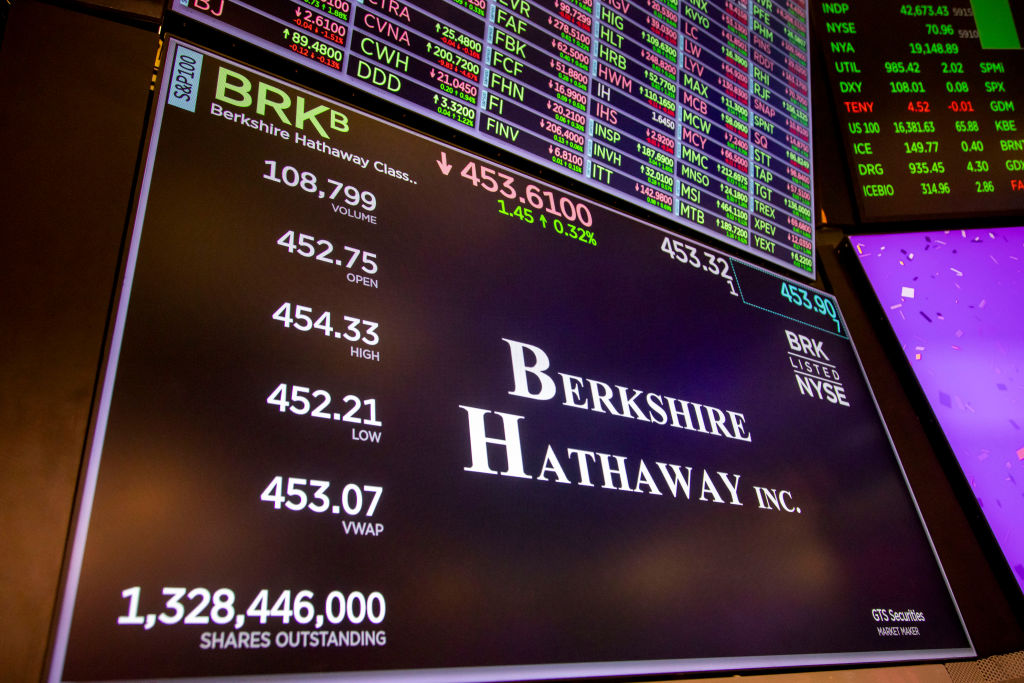It's No Surprise That Berkshire Hathaway's in the 100,000% Return Club
Warren Buffett's fascination with the insurance industry has helped Berkshire Hathaway's stock return snowball.


Profit and prosper with the best of Kiplinger's advice on investing, taxes, retirement, personal finance and much more. Delivered daily. Enter your email in the box and click Sign Me Up.
You are now subscribed
Your newsletter sign-up was successful
Want to add more newsletters?

Delivered daily
Kiplinger Today
Profit and prosper with the best of Kiplinger's advice on investing, taxes, retirement, personal finance and much more delivered daily. Smart money moves start here.

Sent five days a week
Kiplinger A Step Ahead
Get practical help to make better financial decisions in your everyday life, from spending to savings on top deals.

Delivered daily
Kiplinger Closing Bell
Get today's biggest financial and investing headlines delivered to your inbox every day the U.S. stock market is open.

Sent twice a week
Kiplinger Adviser Intel
Financial pros across the country share best practices and fresh tactics to preserve and grow your wealth.

Delivered weekly
Kiplinger Tax Tips
Trim your federal and state tax bills with practical tax-planning and tax-cutting strategies.

Sent twice a week
Kiplinger Retirement Tips
Your twice-a-week guide to planning and enjoying a financially secure and richly rewarding retirement

Sent bimonthly.
Kiplinger Adviser Angle
Insights for advisers, wealth managers and other financial professionals.

Sent twice a week
Kiplinger Investing Weekly
Your twice-a-week roundup of promising stocks, funds, companies and industries you should consider, ones you should avoid, and why.

Sent weekly for six weeks
Kiplinger Invest for Retirement
Your step-by-step six-part series on how to invest for retirement, from devising a successful strategy to exactly which investments to choose.
Editor's note: This is part nine of a 13-part series about companies whose shares have amassed 100,000% returns for investors and the path taken to generate such impressive gains over the long term. See below for links to the other stocks in this series.
The least surprising entry on this list of stocks with 100,000% returns is likely Berkshire Hathaway (BRK.B). Its aw-shucks leader, Warren Buffett, dispenses home-spun wisdom and has a knack for making money. Notably, he does this with his own money as well as other people's.
In consummate Warren Buffett style, he said the worst investment he ever made was the purchase of Berkshire Hathaway itself, a textile company most famous for making shirts. Buffett's reasoning was the money he invested in textiles, if diverted toward insurance companies would have generated $200 billion in returns over the next 45 years.
From just $107.88 $24.99 for Kiplinger Personal Finance
Become a smarter, better informed investor. Subscribe from just $107.88 $24.99, plus get up to 4 Special Issues

Sign up for Kiplinger’s Free Newsletters
Profit and prosper with the best of expert advice on investing, taxes, retirement, personal finance and more - straight to your e-mail.
Profit and prosper with the best of expert advice - straight to your e-mail.
Buffett has always been attracted to the insurance business, owning in whole or in part National Indemnity Company, GEICO, Gateway Underwriters, Berkshire Hathaway Direct Insurance, BoatU.S., and General Re, among many others.
What is the fascination with insurance? In Buffett's mind, insurance is the opposite of a loan. In the lending business, the lender extends say $100,000 and then collects it back with monthly payments.
In insurance, the premium payments, known as "float" come in first, and the payment of the $100,000 insurance benefit arrives much later. And with some insurance products, such as term life insurance, the benefit is never paid at all.
But in Buffett's mind, getting his hands on float is not the end of the process, but the beginning of the process. All that incoming float can be used to invest in or acquire other businesses that generate float or other cash flows.
That's why there are so many insurance companies in the Berkshire portfolio. And the strategy has worked too. In 1970, Berkshire's incoming float was $39 million. In 2023, it was $169 billion.
That's also why the 2008 biography of Warren Buffett was called The Snowball: Warren Buffett and the Business of Life. While the reinvestment of profits and cash flows into other businesses that generated profits and cash flows took time to mature, the long-term effect was wealth grew upon itself like a snowball rolling down a hill.
Like any good investor, Buffett believed in diversification. That's why he invested widely in other companies from furniture makers to candy companies.
Three famous investments include Apple (AAPL), Coca-Cola (KO), and American Express (AXP). And in these investments, we can see the snowball strategy at work.
Coca-Cola is a pretty sleepy company these days. It appreciates, but slowly. In the past five years, shares have grown by about 31%. But if you have owned it for 36 years like Buffett has, it's not so sleepy. His $1.3 billion investment in 1988 is now worth $24.5 billion.
And perhaps most exciting of all, Coca-Cola paid Berkshire Hathaway $736 million in dividends in 2023.
What Buffett saw was one of the most recognized brands on the planet yes, but also a disciplined company with a cost structure that would enable the company to pay and grow a dividend.
What was a split-adjusted annual dividend of 7.5 cents per share in 1988 has grown to $1.84. Since Coke has increased its dividend every year for at least the last 25 years, it's safe to say that Mr. Buffett's $736 million dividend haul will grow over time.
Even Apple, which is a consumer electronics company, has at its core, a compounding effect that attracted Mr. Buffett.
As the Apple ecosystem grew, the earnings from upgrades and services became more reliable, and accelerated, driving earnings per share, which in turn have driven Apple's share price. Mr. Buffett's investment of approximately $25 billion in 2016 is now valued at more than $135 billion.
Note: This content first appeared in Louis Navellier's latest book, The Sacred Truths of Investing: Finding Growth Stocks that Will Make You Rich, which was published by John Wiley & Sons, Inc.
Other 100,000% return stocks
- McDonald's Stock: How Small Changes Have Led to 100,000% Returns
- How Amazon Stock Became a Member of the 100,000% Return Club
- M&A Is Why UnitedHealth Group Stock Is a Member of the 100,000% Return Club
- Sherwin-Williams Is a Sleeper of the 100,000% Return Club
- Dealmaking Drives HEICO Stock's 100,000% Return
- Adobe Stock's Path to a 100,000% Return Is Impressive
- Apple's 100,000% Return Is a Result of Innovation, Brand Loyalty and Buybacks
- Home Depot's Winning Ways Fueled Its 100,000% Return
Profit and prosper with the best of Kiplinger's advice on investing, taxes, retirement, personal finance and much more. Delivered daily. Enter your email in the box and click Sign Me Up.

-
 How Much It Costs to Host a Super Bowl Party in 2026
How Much It Costs to Host a Super Bowl Party in 2026Hosting a Super Bowl party in 2026 could cost you. Here's a breakdown of food, drink and entertainment costs — plus ways to save.
-
 3 Reasons to Use a 5-Year CD As You Approach Retirement
3 Reasons to Use a 5-Year CD As You Approach RetirementA five-year CD can help you reach other milestones as you approach retirement.
-
 Your Adult Kids Are Doing Fine. Is It Time To Spend Some of Their Inheritance?
Your Adult Kids Are Doing Fine. Is It Time To Spend Some of Their Inheritance?If your kids are successful, do they need an inheritance? Ask yourself these four questions before passing down another dollar.
-
 The 4 Estate Planning Documents Every High-Net-Worth Family Needs (Not Just a Will)
The 4 Estate Planning Documents Every High-Net-Worth Family Needs (Not Just a Will)The key to successful estate planning for HNW families isn't just drafting these four documents, but ensuring they're current and immediately accessible.
-
 Love and Legacy: What Couples Rarely Talk About (But Should)
Love and Legacy: What Couples Rarely Talk About (But Should)Couples who talk openly about finances, including estate planning, are more likely to head into retirement joyfully. How can you get the conversation going?
-
 How to Get the Fair Value for Your Shares When You Are in the Minority Vote on a Sale of Substantially All Corporate Assets
How to Get the Fair Value for Your Shares When You Are in the Minority Vote on a Sale of Substantially All Corporate AssetsWhen a sale of substantially all corporate assets is approved by majority vote, shareholders on the losing side of the vote should understand their rights.
-
 Dow Leads in Mixed Session on Amgen Earnings: Stock Market Today
Dow Leads in Mixed Session on Amgen Earnings: Stock Market TodayThe rest of Wall Street struggled as Advanced Micro Devices earnings caused a chip-stock sell-off.
-
 How to Add a Pet Trust to Your Estate Plan: Don't Leave Your Best Friend to Chance
How to Add a Pet Trust to Your Estate Plan: Don't Leave Your Best Friend to ChanceAdding a pet trust to your estate plan can ensure your pets are properly looked after when you're no longer able to care for them. This is how to go about it.
-
 Want to Avoid Leaving Chaos in Your Wake? Don't Leave Behind an Outdated Estate Plan
Want to Avoid Leaving Chaos in Your Wake? Don't Leave Behind an Outdated Estate PlanAn outdated or incomplete estate plan could cause confusion for those handling your affairs at a difficult time. This guide highlights what to update and when.
-
 I'm a Financial Adviser: This Is Why I Became an Advocate for Fee-Only Financial Advice
I'm a Financial Adviser: This Is Why I Became an Advocate for Fee-Only Financial AdviceCan financial advisers who earn commissions on product sales give clients the best advice? For one professional, changing track was the clear choice.
-
 Nasdaq Slides 1.4% on Big Tech Questions: Stock Market Today
Nasdaq Slides 1.4% on Big Tech Questions: Stock Market TodayPalantir Technologies proves at least one publicly traded company can spend a lot of money on AI and make a lot of money on AI.